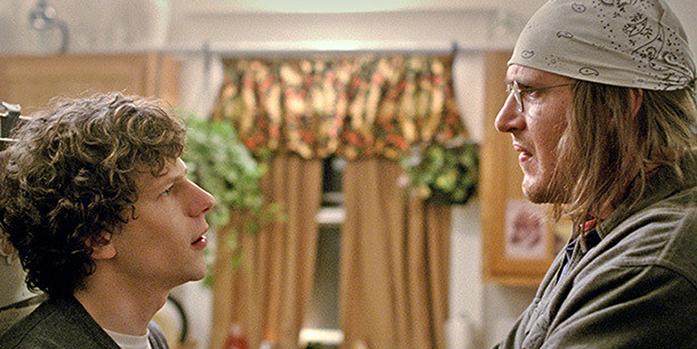By Girindra Selleck
girindra-selleck@uiowa.edu
8.5 out of 10
In one of the year’s most surprising turns, Jason Segel stuns with his masterful portrayal of the iconic postmodern novelist David Foster Wallace in The End of the Tour. Segel, previously pegged as a comedies-only actor known best for his roles in Forgetting Sarah Marshall and How I Met Your Mother, must have been paying close attention in 2013/2014 when a similar turn of events revealed Matthew McConaughey to be one of the generation’s great actors. McConaughey’s rejection of his romantic-comedy inundated filmography brought him the Academy Award for his depiction of HIV-positive redneck Ron Woodroof; is it possible that Segel’s path follows suit? I would bank on a nomination, at least.
Segel’s film — and despite any attempts to call it otherwise, it is Segel’s film — follows Wallace on the last leg of his 1996 book tour for Infinite Jest, during which a blossoming journalist and writer for Rolling Stone (David Lipsky, played by a manic, weasely, brilliant Jesse Eisenberg) is writing a profile on him. The film focuses on the troubled and brilliant Wallace who, at this point, is resisting the urge to become accustomed to the fame he is experiencing.
Shy and reclusive, Wallace lives in Bloomington, Illinois, with his two dogs in a house he recently had unlisted from the phone book (strange concept, isn’t it? In the age of information). When Lipsky first calls Wallace at his home, he is asked how he got the number, and is promptly told to lose it — a statement Wallace later reveals was “only 95 percent a joke.”
This struggle with the idea of celebrity and an acclamation to widespread recognition is at the heart of the movie’s plot. Wallace, fresh off the publication of his magnum opus Infinite Jest, is being tapped by New York’s Walter Kirn as the surefire winner of that year’s major literary awards (in what remains one of literary criticisms biggest mysteries, Infinite Jest wasn’t even nominated for the Pulitzer or the National Book Award).
On the flipside, Lipsky is desperate to garner even a taste of the recognition Wallace is experiencing. The big brother/little brother relationship between the two characters drives the movie’s plot, in which this duality provides for some of the most stimulating dialogue between its two protagonists.
The premise is simple, and not much of note actually happens in the movie, but this makes it no less of a thrill to watch. If anything, the absence of dramatic events encourages the viewer to actually listen to what the characters are saying, and allows them to fill in the drama themselves.
The End of the Tour follows in the lineage of films like My Dinner With Andre — Louis Malle’s 1981 classic but somewhat inaccessible film whose two hours consist only of a dinner conversation between Wallace Shawn and Andre Gregory — but Tour succeeds where its predecessors might have failed, in that this film doesn’t come across as a challenge to watch.
However, Tour and its actors demand your respect, and fairly so, as, in Segel, the film marks the arrival of a new contender in this year’s Best Actor race.



